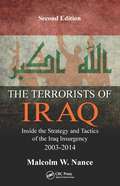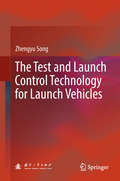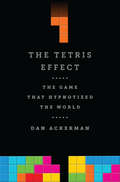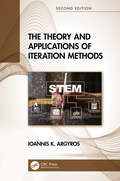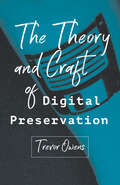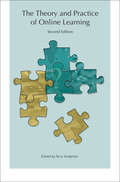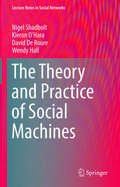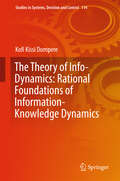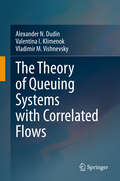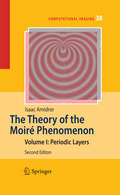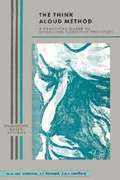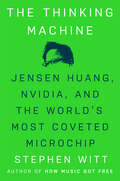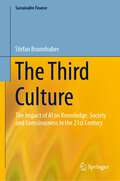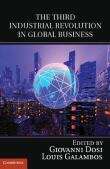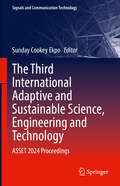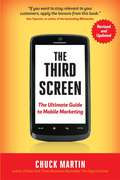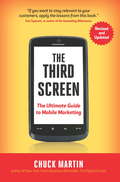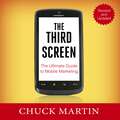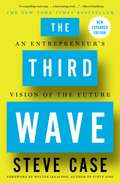- Table View
- List View
The Terrorists of Iraq: Inside the Strategy and Tactics of the Iraq Insurgency 2003-2014, Second Edition
by Malcolm W. NanceThe Terrorists of Iraq: Inside the Strategy and Tactics of the Iraq Insurgency 2003-2014, Second Edition is a highly detailed and exhaustive history and analysis of terror groups that both formed the Iraq insurgency and led to the rise of the Islamic State of Iraq and Syria (ISIS). It places heavy emphasis on the history, organization, and personal
The Test and Launch Control Technology for Launch Vehicles
by Zhengyu SongThis book presents technologies and solutions related to the test and launch control of rockets and other vehicles, and offers the first comprehensive and systematic introduction to the contributions of the Chinese Long March (Chang Zheng in Chinese, or abbreviated as CZ) rockets in this field. Moreover, it discusses the role of this technology in responsive, reliable, and economical access to space, which is essential for the competitiveness of rockets. The need for rapid development of the aerospace industry for both governmental and commercial projects is addressed. This book is a valuable reference resource for practitioners, and many examples and resources are included, not only from Chinese rockets but also from many other vehicles. It covers guidelines, technologies, and solutions on testing and launch control before rocket takeoff, covering equipment-level testing, system-level testing, simulation tests, etc.
The Tetris Effect: The Cold War Battle for the World's Most Addictive Game
by Dan Ackerman21 February 1989. Three men fly into Moscow, representing software giants from Britain, America, and Japan. Each of them is determined to undercut the others in order to secure a technology so powerfully addictive it has brought the government department that created it to a standstill. In a country on the brink of seismic change, where spycraft is about to give way to cut-throat capitalism, Tetris has become the grand prize. Featuring corporate espionage, unmarked government organizations, courtroom drama and international conspiracies, the origin of the world&’s most popular video game is a gripping, fast-paced thriller of the highest order. Not only this, but it is also the tale of a one-in-a-million software start-up – a unique example of an idea, a product, and an era coming together at exactly the right moment. Tetris was perfectly (if accidentally) crafted to hit primal triggers in our minds and in Ackerman&’s hands its story is unputdownable.
The Tetris Effect: The Game that Hypnotized the World
by Dan AckermanThe definitive story of a game so great, even the Cold War couldn't stop itTetris is perhaps the most instantly recognizable, popular video game ever made. But how did an obscure Soviet programmer, working on frail, antiquated computers, create a product which has now earned nearly 1 billion in sales? How did a makeshift game turn into a worldwide sensation, which has been displayed at the Museum of Modern Art, inspired a big-budget sci-fi movie, and been played in outer space?A quiet but brilliant young man, Alexey Pajitnov had long nurtured a love for the obscure puzzle game pentominoes, and became obsessed with turning it into a computer game. Little did he know that the project that he labored on alone, hour after hour, would soon become the most addictive game ever made.In this fast-paced business story, reporter Dan Ackerman reveals how Tetris became one of the world's first viral hits, passed from player to player, eventually breaking through the Iron Curtain into the West. British, American, and Japanese moguls waged a bitter fight over the rights, sending their fixers racing around the globe to secure backroom deals, while a secretive Soviet organization named ELORG chased down the game's growing global profits.The Tetris Effect is an homage to both creator and creation, and a must-read for anyone who's ever played the game—which is to say everyone.
The Text Mining Handbook
by Ronen Feldman James SangerText mining tries to solve the crisis of information overload by combining techniques from data mining, machine learning, natural language processing, information retrieval, and knowledge management. In addition to providing an in-depth examination of core text mining and link detection algorithms and operations, this book examines advanced pre-processing techniques, knowledge representation considerations, and visualization approaches. Finally, it explores current real-world, mission-critical applications of text mining and link detection in such varied fields as M&A business intelligence, genomics research and counter-terrorism activities.
The Thank You Economy
by Gary Vaynerchuk“Gary Vaynerchuk has seen the future of marketing. The Thank You Economy shows how it's built on both the time-honored techniques of listening to and appreciating customers and newer services like Twitter that allow you to engage directly with customers at unprecedented scale and speed. The book, like Gary, is also a lot of fun and full of passion.” —Dick Costolo, chief executive officer, TwitterGary Vaynerchuk, the New York Times bestselling author and creator of Wine Library TV, is back with a bold and expansive look at the evolution of today's marketplace, revealing the essential factors defining and driving successful relationships between businesses and consumers. In this groundbreaking follow-up to the bestselling Crush It!, Vaynerchuk—one of Bloomberg Businessweek’s “20 People Every Entrepreneur Should Follow”—looks beyond a numbers-based analysis to explore the value of social interactions in building our economy.
The Theory and Applications of Iteration Methods
by Ioannis K. ArgyrosThe theory and applications of Iteration Methods is a very fast-developing field of numerical analysis and computer methods. The second edition is completely updated and continues to present the state-of-the-art contemporary theory of iteration methods with practical applications, exercises, case studies, and examples of where and how they can be used. The Theory and Applications of Iteration Methods, Second Edition includes newly developed iteration methods taking advantage of the most recent technology (computers, robots, machines). It extends the applicability of well-established methods by increasing the convergence domain and offers sharper error tolerance. New proofs and ideas for handling convergence are introduced along with a new variety of story problems picked from diverse disciplines. This new edition is for researchers, practitioners, and students in engineering, economics, and computational sciences.
The Theory and Craft of Digital Preservation
by Trevor OwensA guide to managing data in the digital age.Winner of the ALCTS Outstanding Publication Award by the Association for Library Collections & Technical Services, Winner of the Waldo Gifford Leland Award by the Society of American ArchivistsMany people believe that what is on the Internet will be around forever. At the same time, warnings of an impending "digital dark age"—where records of the recent past become completely lost or inaccessible—appear with regular frequency in the popular press. It's as if we need a system to safeguard our digital records for future scholars and researchers. Digital preservation experts, however, suggest that this is an illusory dream not worth chasing. Ensuring long-term access to digital information is not that straightforward; it is a complex issue with a significant ethical dimension. It is a vocation.In The Theory and Craft of Digital Preservation, librarian Trevor Owens establishes a baseline for practice in this field. In the first section of the book, Owens synthesizes work on the history of preservation in a range of areas (archives, manuscripts, recorded sound, etc.) and sets that history in dialogue with work in new media studies, platform studies, and media archeology. In later chapters, Owens builds from this theoretical framework and maps out a more deliberate and intentional approach to digital preservation. A basic introduction to the issues and practices of digital preservation, the book is anchored in an understanding of the traditions of preservation and the nature of digital objects and media. Based on extensive reading, research, and writing on digital preservation, Owens's work will prove an invaluable reference for archivists, librarians, and museum professionals, as well as scholars and researchers in the digital humanities.
The Theory and Practice of Online Learning
by Terry AndersonIn this important collection of essays by practitioners and scholars that has been downloaded nearly half a million times is an overview of some of the most pressing issues in online education. By addressing transformations arising from educational technology advances and the new business conditions and modes of delivery of education, the contributors to The Theory and Practice of Online Learning provide insights into this complex, diverse, and rapidly evolving field.
The Theory and Practice of Social Machines (Lecture Notes in Social Networks)
by Wendy Hall Nigel Shadbolt Kieron O’Hara David De RoureSocial machines are a type of network connected by interactive digital devices made possible by the ubiquitous adoption of technologies such as the Internet, the smartphone, social media and the read/write World Wide Web, connecting people at scale to document situations, cooperate on tasks, exchange information, or even simply to play. Existing social processes may be scaled up, and new social processes enabled, to solve problems, augment reality, create new sources of value, and disrupt existing practice.This book considers what talents one would need to understand or build a social machine, describes the state of the art, and speculates on the future, from the perspective of the EPSRC project SOCIAM – The Theory and Practice of Social Machines. The aim is to develop a set of tools and techniques for investigating, constructing and facilitating social machines, to enable us to narrow down pragmatically what is becoming a wide space, by asking ‘when will it be valuable to use these methods on a sociotechnical system?’ The systems for which the use of these methods adds value are social machines in which there is rich person-to-person communication, and where a large proportion of the machine’s behaviour is constituted by human interaction.
The Theory and Practice of Writing Music for Games
by Steve Horowitz Scott R. LooneyThe nature of game music charges the modern-day composer with understanding a whole host of aesthetic and technical principles unique to the medium. Based on years of working in the field, as well as teaching the subject at colleges and universities, The Theory and Practice of Writing Music for Games is an invaluable resource for those looking for a classroom tested, directed course of study. As players and composers, themselves, authors Steve Horowitz and Scott R. Looney share the inspiration and joy of game music with an emphasis on critical thinking and the creative process, exploring the parallels and distinctions to concert music, film, TV, cartoons, and other popular forms. Each chapter builds on the next and guides the reader step by step through the essentials. Along with all the theory, a multitude of clearly defined hands-on projects and exercises are included, designed to prepare the reader to go out into the field with a complete understanding of the art and craft of music composition for games and visual media. Key Features:• Discusses a variety of topics in a simple and easy-to-understand format.• Provides a valuable resource for teachers and students, anyone who is looking to build a career in music for games.• Breaks down the fundamentals needed to build your career.• Includes fun and practical exercises that strengthen your composer chops.
The Theory of Info-Dynamics: Rational Foundations of Information-Knowledge Dynamics
by Kofi K. DompereThis book focuses on the development of a theory of info-dynamics to support the theory of info-statics in the general theory of information. It establishes the rational foundations of information dynamics and how these foundations relate to the general socio-natural dynamics from the primary to the derived categories in the universal existence and from the potential to the actual in the ontological space. It also shows how these foundations relate to the general socio-natural dynamics from the potential to the possible to give rise to the possibility space with possibilistic thinking; from the possible to the probable to give rise to possibility space with probabilistic thinking; and from the probable to the actual to give rise to the space of knowledge with paradigms of thought in the epistemological space. The theory is developed to explain the general dynamics through various transformations in quality-quantity space in relation to the nature of information flows at each variety transformation. The theory explains the past-present-future connectivity of the evolving information structure in a manner that illuminates the transformation problem and its solution in the never-ending information production within matter-energy space under socio-natural technologies to connect the theory of info-statics, which in turn presents explanations to the transformation problem and its solution. The theoretical framework is developed with analytical tools based on the principle of opposites, systems of actual-potential polarities, negative-positive dualities under different time-structures with the use of category theory, fuzzy paradigm of thought and game theory in the fuzzy-stochastic cost-benefit space. The rational foundations are enhanced with categorial analytics.The value of the theory of info-dynamics is demonstrated in the explanatory and prescriptive structures of the transformations of varieties and categorial varieties at each point of time and over time from parent–offspring sequences. It constitutes a general explanation of dynamics of information-knowledge production through info-processes and info-processors induced by a socio-natural infinite set of technologies in the construction–destruction space.
The Theory of Queuing Systems with Correlated Flows
by Alexander N. Dudin Valentina I. Klimenok Vladimir M. VishnevskyThis book is dedicated to the systematization and development of models, methods, and algorithms for queuing systems with correlated arrivals. After first setting up the basic tools needed for the study of queuing theory, the authors concentrate on complicated systems: multi-server systems with phase type distribution of service time or single-server queues with arbitrary distribution of service time or semi-Markovian service. They pay special attention to practically important retrial queues, tandem queues, and queues with unreliable servers. Mathematical models of networks and queuing systems are widely used for the study and optimization of various technical, physical, economic, industrial, and administrative systems, and this book will be valuable for researchers, graduate students, and practitioners in these domains.
The Theory of the Moiré Phenomenon
by Isaac AmidrorThis book presents the most comprehensive and methodical work on the theory of the moiré phenomenon, providing a full general-purpose and application-independent exposition of this fascinating effect. Based on the Fourier theory, it leads the reader through the various phenomena which occur in the superposition of repetitive layers, both in the image and in the spectral domains. The first chapters of the book present the basic theory, covering the superposition of monochrome, periodic layers. In later chapters, the theory is extended to the even more interesting cases of polychromatic moirés and moirés between repetitive, non-periodic layers. Throughout the whole text the book favours a pictorial, intuitive approach, which is supported by mathematics, and the discussion is accompanied by a large number of figures and illustrative examples. The prerequisite mathematical background is limited to an elementary familiarity with the Fourier theory.
The Think Aloud Method: A practical guide to modelling cognitive processes
by "Maarten W. van Someren Yvonne F. Barnard Jacobijn A. C. Sandberg "This book presents a detailed description of the Think Aloud Method, which was developed to facilitate knowledge acquisition and problem-solving by asking the participant to think aloud while solving a problem. The Think Aloud Method is based on the premise that people are often able to verbalize their thoughts as they solve a problem, and their resulting behavior can be analyzed to answer questions about problem solving behavior. This method is useful for psychological research on problem solving behavior, as well as for knowledge acquisition in the context of building expert computer programs. In many cases the Think Aloud Method is an invaluable source of information for psychologists and knowledge engineers.
The Thinking Machine: Jensen Huang, Nvidia, and the World's Most Coveted Microchip
by Stephen Witt&“A lively biography. . . . The story of how Nvidia became the hottest investment on Wall Street and a household name is fascinating.&” —The New York Times Book Review &“Stephen Witt&’s deep reporting shines through every page of The Thinking Machine. The result is a page-turning biography of perhaps the most consequential CEO and company in the world.&” —David Epstein, New York Times bestselling author of Range Nvidia is as valuable as Apple and Microsoft. It has shaped the world as we know it. But its story is little known. This is the definitive story of the greatest technology company of our times.In June of 2024, thirty-one years after its founding in a Denny&’s restaurant, Nvidia became the most valuable corporation on Earth. The Thinking Machine is the astonishing story of how a designer of video game equipment conquered the market for AI hardware, and in the process re-invented the computer.Essential to Nvidia&’s meteoric success is its visionary CEO Jensen Huang, who more than a decade ago, on the basis of a few promising scientific results, bet his entire company on AI. Through unprecedented access to Huang, his friends, his investors, and his employees, Witt documents for the first time the company&’s epic rise and its single-minded and ferocious leader, now one of Silicon Valley&’s most influential figures.The Thinking Machine is the story of how Nvidia evolved to supplying hundred-million-dollar supercomputers. It is the story of a determined entrepreneur who defied Wall Street to push his radical vision for computing, becoming one of the wealthiest men alive. It is the story of a revolution in computer architecture, and the small group of renegade engineers who made it happen. And it&’s the story of our awesome and terrifying AI future, which Huang has billed as the &‘next industrial revolution,&’ as a new kind of microchip unlocks hyper-realistic avatars, autonomous robots, self-driving cars, and new movies, art, and books, generated on command.This is the story of the company that is inventing the future.
The Third Apple: Personal Computers and the Cultural Revolution
by Jean-Louis GasséeThe title refers not to Eve's or Newton's apple, but the computer.
The Third Culture: The Impact of AI on Knowledge, Society and Consciousness in the 21st Century (Sustainable Finance)
by Stefan BrunnhuberWe are currently witnessing the emergence of a ‘third culture’, driven by unprecedented developments that are changing the playing field. These include advances in AI, big data analysis and robotics. The traditional ‘two cultures’ view (S. P. Snow) distinguishes between the sciences and the humanities. The wisdoms these two cultures offer are separated from each other, with little to no interaction or mutual comprehension. However, over the past two decades, and for the first time in human history, a new, third culture has appeared. This new culture, rooted in new technologies, not only pursues its own form of rationality but also supports advances in the original two cultures, deepening and expanding our individual and collective consciousness so that we can see more and do better. It will eventually give rise to new forms of consciousness based not on biochemical signals, but on copper wires and lithium chips. These new machine intelligences will change the world and force us to realise: we are no longer alone. The human species’ position in the twenty-first century will be fundamentally redefined: not as a conductor leading the orchestra, but a single string player within it.
The Third Industrial Revolution in Global Business
by Louis Galambos Giovanni DosiThe essays in this volume probe the impact the digital revolution has had, or sometimes failed to have, on global business. Has digital technology, the authors ask, led to structural changes and greater efficiency and innovation? While most of the essays support the idea that the information age has increased productivity in global business, the evidence of a "revolution" in the ways industries are organized is somewhat more blurred, with both significant discontinuities and features which persist from the "second" industrial revolution.
The Third International Adaptive and Sustainable Science, Engineering and Technology: ASSET 2024 Proceedings (Signals and Communication Technology)
by Sunday Cookey EkpoThis proceedings presents papers from the Third International Adaptive and Sustainable Science, Engineering and Technology Conference (ASSET 2024), which took place in Manchester, UK on July 16-18, 2024. The ASSET conference serves as an interactive forum for the advancement of the practice of adaptive and sustainable systems across the multiple disciplines and specialty areas involved with the science, engineering, and technology of integrated entities, complex systems, and networks. The conference provides an avenue for practitioners, researchers, managers, developers, analysts, educators, and users to exchange innovative ideas, concepts, applications, and lessons learned in addressing domain-specific problems, applications-oriented topics, methodologies, standards and multidisciplinary research opportunities and findings relating to ASSET systems.
The Third Screen
by Chuck MartinChuck Martin takes readers on a journey from the creation of the first screen to the revolutionary third. Martin describes the cultural and social changes incurred by the first screen (the television) and the second screen (the personal computer), opening up his discussion of how the third screen--the mobile device--is redefining the role of the consumer.
The Third Screen, New Edition: The Ultimate Guide To Mobile Marketing
by Chuck MartinThe Ultimate Guide to Mobile Marketing - Revised and UpdatedAn American Express Open Forum Best Business BookWe are in the midst of a technological revolution bigger than the television or the PC. How do we, as marketers, harness mobile technology to serve our customers most effectively?With the "first screen"-the television-companies sent ads directly into consumers' living rooms, reaching millions with one campaign. The "second screen"-the personal computer-increased interaction between companies and consumers and allowed for immediate customer feedback. Now, the "third screen"-the mobile device-changed the game in an even more revolutionary way. The Third Screen: The Ultimate Guide to Mobile Marketing defines the implications, strategies, and tactics used to thrive in business during the mobile revolution. This revised, updated paperback links technological developments to behavioral changes, reveals the unexpected forces of thechanges in mobile, and equips marketers and businesses for the future.A new breed of consumer has emerged: on the go and always on, tapping into content at the touch of a button-anytime, anywhere.
The Third Screen: The Ultimate Guide to Mobile Marketing
by Chuck MartinWith the "first screen"-the television-companies sent ads directly into consumers' living rooms, reaching millions with one campaign. The "second screen"-the personal computer-increased interaction between companies and consumers and allowed for immediate customer feedback. Now, the "third screen"-the mobile device- changed the game in an even more revolutionary way. The Third Screen: The Ultimate Guide to Mobile Marketing defines the implications, strategies, and tactics used to thrive in business during the mobile revolution. This revised, updated paperback links technological developments to behavioral changes, reveals the unexpected forces of the changes in mobile, and equips marketers and businesses for the future.
The Third Screen: The Ultimate Guide to Mobile Marketing
by Chuck MartinThe Third Screen: The Ultimate Guide to Mobile Marketing defines the implications, strategies, and tactics used to thrive in business during the mobile revolution.With the "first screen"-the television-companies sent ads directly into consumers' living rooms, reaching millions with one campaign. The "second screen"-the personal computer-increased interaction between companies and consumers and allowed for immediate customer feedback. Now, the "third screen"-the mobile device- changed the game in an even more revolutionary way. The Third Screen: The Ultimate Guide to Mobile Marketing defines the implications, strategies, and tactics used to thrive in business during the mobile revolution. This revised, updated paperback links technological developments to behavioral changes, reveals the unexpected forces of the changes in mobile, and equips marketers and businesses for the future.(P)2017 John Murray Press
The Third Wave: An Entrepreneur's Vision of the Future
by Steve Case<P> One of America's most accomplished entrepreneurs--a pioneer who made the Internet part of everyday life and orchestrated the largest merger in the history of business--shares a roadmap for how anyone can succeed in a world of rapidly changing technology. <P>Steve Case's career began when he cofounded America Online (AOL) in 1985. At the time, only three percent of Americans were online. It took a decade for AOL to achieve mainstream success, and there were many near-death experiences and back-to-the-wall pivots. AOL became the top performing company of the 1990s, and at its peak more than half of all consumer Internet traffic in the United States ran through the service. After Case engineered AOL's merger with Time Warner and he became Chairman of the combined business, Case oversaw the biggest media and communications empire in the world. <P>In The Third Wave, which pays homage to the work of the futurist Alvin Toffler (from whom Case has borrowed the title, and whose work inspired him as a young man), Case takes us behind the scenes of some of the most consequential and riveting business decisions of our time while offering illuminating insights from decades of working as an entrepreneur, an investor, a philanthropist, and an advocate for sensible bipartisan policies. We are entering, as Case explains, a new paradigm called the "Third Wave" of the Internet. The first wave saw AOL and other companies lay the foundation for consumers to connect to the Internet. <P>The second wave saw companies like Google and Facebook build on top of the Internet to create search and social networking capabilities, while apps like Snapchat and Instagram leverage the smartphone revolution. Now, Case argues, we're entering the Third Wave: a period in which entrepreneurs will vastly transform major "real world" sectors like health, education, transportation, energy, and food--and in the process change the way we live our daily lives. But success in the Third Wave will require a different skill set, and Case outlines the path forward. <P>The Third Wave is part memoir, part manifesto, and part playbook for the future. With passion and clarity, Case explains the ways in which newly emerging technology companies (a growing number of which, he argues, will not be based in Silicon Valley) will have to rethink their relationships with customers, with competitors, and with governments; and offers advice for how entrepreneurs can make winning business decisions and strategies--and how all of us can make sense of this changing digital age. <P><b>A New York Times Bestseller</b>
